
The Business of Fashion
Agenda-setting intelligence, analysis and advice for the global fashion community.

Agenda-setting intelligence, analysis and advice for the global fashion community.
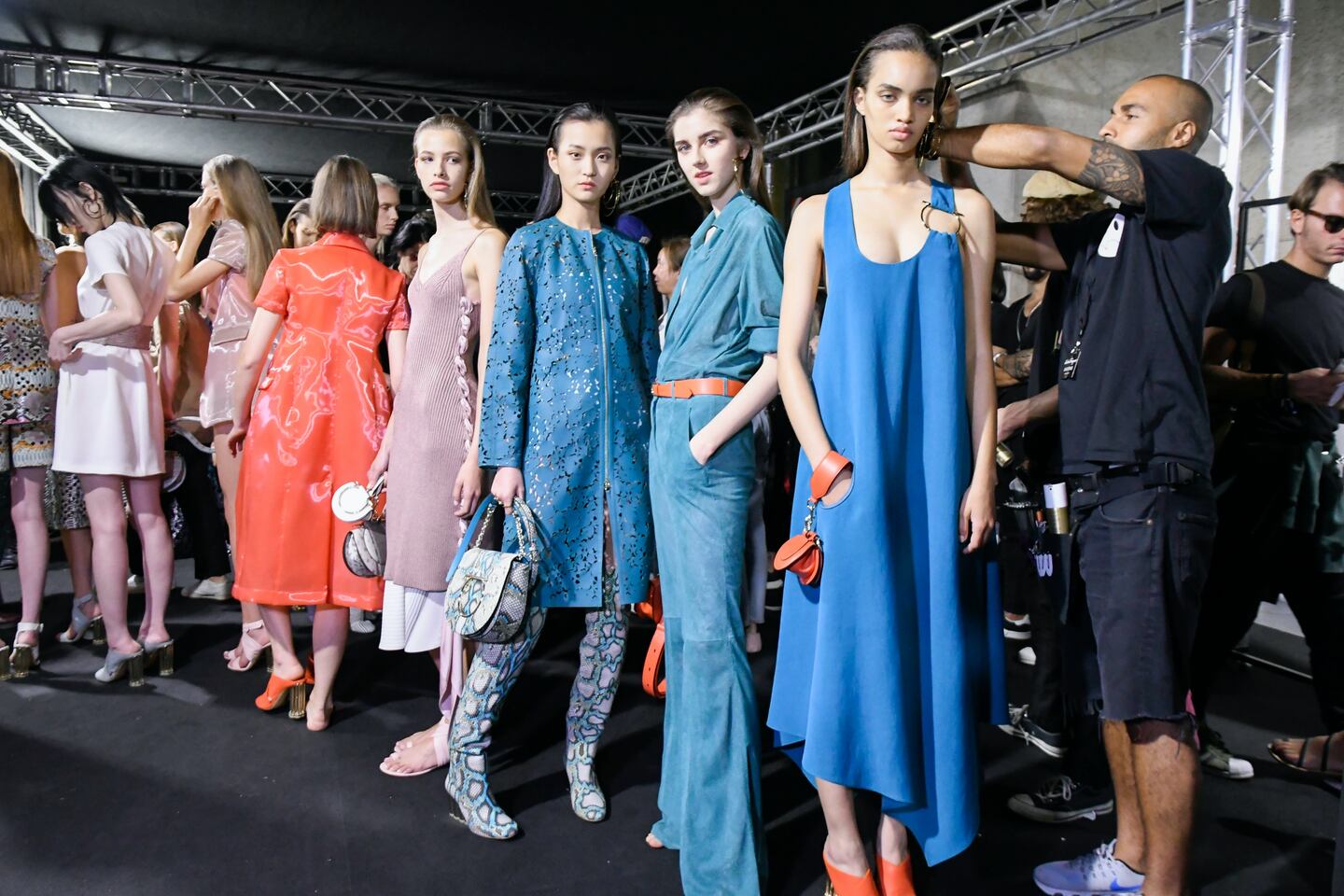
NEW YORK, United States — James Scully, prominent casting director and accidental advocate, is stepping away from the work that made his name. This autumn, he won't be casting any Spring/Summer 2019 shows or campaigns, but volunteering on the New York State midterm election campaign instead.
However, Scully is not stepping away from the industry that irrevocably changed him, and that he has irrevocably changed.
Over the past two years, Scully has spent more and more time fighting for the rights of models, working closely with Sara Ziff, founder of the Model Alliance, a US organisation that aims to protect the young women and men hurt, damaged and sometimes destroyed by the abuse he has helped to expose. Last autumn, Ziff and Scully partnered with publishing house Condé Nast to design a new code of conduct that would protect models from workplace abuses and sexual misconduct. Earlier in 2017, rivals Kering and LVMH joined forces by establishing a charter protecting model well-being, following Scully's whistleblowing talk at VOICES, BoF's annual gathering for big thinkers, in December 2016.
But though Scully sees evidence of progress, there has also been regression. Many prominent industry players accused of abuse are still working, and others have vehemently denied any wrongdoing. In The New York Times, photographer Mario Testino said that his multiple accusers “cannot be considered reliable sources.” In The Boston Globe, Patrick Demarchelier said that “people lie and they tell stories.”
ADVERTISEMENT
What then, if anything, has changed?
On a thick-with-humidity summer day in Manhattan, BoF summoned Ziff, supermodel-turned-activist Karen Elson and Scully to discuss where we are and where we need to be. Sara Ziff is American fashion model, activist and founder of the Model Alliance, a not-for-profit organisation working to create policies that will help protect the rights of working models. James Scully is a casting director, advocate and activist. For the past two years, he has dedicated his life to holding the industry accountable for its behaviour towards models. Karen Elson is an English supermodel, musician and Save the Children ambassador. One of the few models of her calibre to speak publicly about personal experiences with mistreatment and harassment. The conversation was moderated by Lauren Sherman, The Business of Fashion's chief correspondent in New York.
Phase 1: Denial. “A lot of people won’t admit what they’ve done.”
Lauren Sherman: There are still a lot of excuses being made for bad behaviour in fashion — perhaps more so than other industries that have been publicly affected by the #MeToo movement. You're trying to change things. What brought you to this point?
James Scully: Early on, several years ago, Sara brought to light issues of abuse, non-payment, so many issues. On my side, I wasn't really privy to that information. Then, when I saw it in my own day-to-day work, I felt like I had to do something. There were just so many things happening in Paris that were so egregious and shocking to me.
Karen Elson: I was actually a little nervous for you, in the most loving of ways, because I thought, "Wow, James has just spoken the truth." I kept thinking, will you experience some form of backlash for being honest? I've occasionally been labelled "difficult" for speaking my truth. For no-brainers like, "I'm new, can we [close] this set off from people who don't need to be on set." Or if I noticed, "Hey, this little girl is 16 and her breasts are showing, can somebody be an adult." That's when I'm labelled difficult. "Oh God, here she goes again." It's a mentality of people who are just not willing to see something for what it is. And I'm not saying that they're doing it because they're a morally corrupt person, I just think the business has been so —
JS: Normalised! The behaviour…
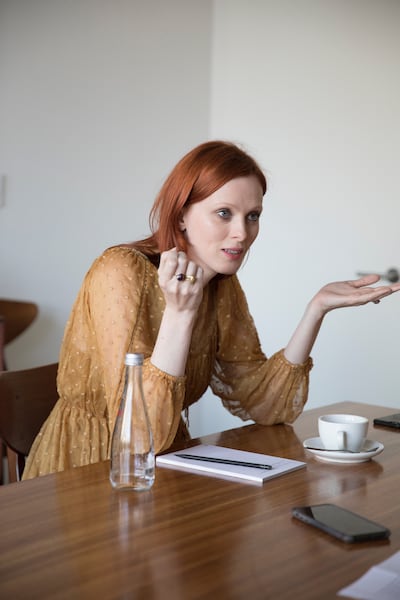
Karen Elson | Source: Photo by Katharina Poblotzki
ADVERTISEMENT
KE: Exactly. I was on a shoot the other day and somebody said to me, "Oh, you work with the Model Alliance. I better be careful what I say to you." It was a careless comment. Clearly they were joking. But there was a grain of truth within it. Realising that having an allegiance with you, sometimes people can think that maybe we're just being big ball-busters instead of trying to make [the business] ethical. When I get on set, I don't want to feel like I'm an object.
LS: Sara, do you feel that people are now more receptive and more open to working with you or do you think they're still afraid?
Sara Ziff: Look, we are all sitting here. So I think just the fact that we're having this conversation shows that we're making progress. But stepping back, it's important to recognise that we're talking about systemic problems, which go beyond the offhand remarks. This is a business that is essentially still largely unregulated, where there are no industry standards. We have seen in the last year the introduction of the Condé Nast code of conduct, the LVMH and Kering charter, but industry standards and codes without enforcement mechanisms in place are not standards. They are aspirations.
JS: The nice thing is that, for so many years the agencies were resistant to help the Model Alliance and now… I think the one thing the industry has learned collectively is that this is serious. Now we all have to take responsibility for what we've done. A lot of people won't admit what they've done, but at least they want to address the problem.
KE: The top five agencies may offer their support, but there are different levels. I've worked with the same hundred people for the past 20 years. Sara isn't just fighting for my corner in fashion. There is more going on.
JS: The thing that is most upsetting to me is that these kids just get discarded, literally. What I've been trying to impart to people is [that] we are sending thousands of damaged people into the world.
LS: We joke about this, but it really does sound like a form of Stockholm syndrome.
JS: Absolutely. Lots of casting directors have it, lots of stylists have it, lots of assistants at magazines. One of the most abused groups of people in the world are the assistants and stylists.
ADVERTISEMENT
KE: I've seen fashion assistants abused, hit, because they haven't brought the right look!
JS: It's so pervasive and insular.
SZ: I'd say the change is in the acknowledgement of the problem. But the behaviour hasn't changed that much because there is not currently a system in place to address these concerns. Which is precisely what we are working to accomplish through the Respect programme, which is an industry-wide initiative that would create not only industry-wide standards, but also enforcement mechanisms to uphold those standards. It's a win-win situation.
Phase 2: Acknowledgement. “We can’t use cosmetic manoeuvres to address these deep-seeded issues.”
JS: Everyone knows what the problem is. Everyone's willing to do something about it, but nobody wants to shake hands. They're all like, "I'll do it if someone else does it, but I'm not doing it yet." Really?
KE: It's like they're waiting for someone to take the plunge and then everyone will follow.
JS: You know, LVMH and Kering did it, but now no one else is doing it.
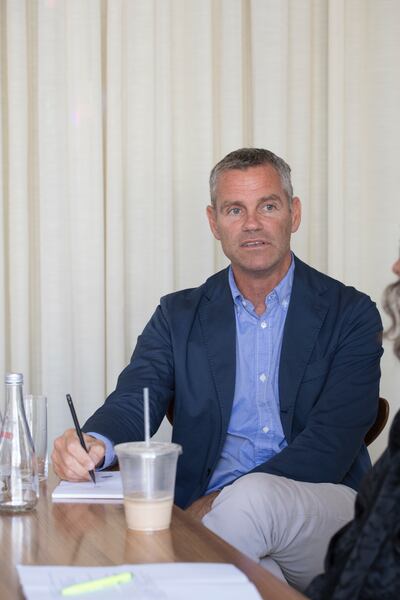
James Scully | Source: Photo by Katharina Poblotzki
LS: What is it about fashion that fosters this sort of culture? Fashion is supposed to be forward-thinking, progressive.
JS: But now it's a fear-based industry.
SZ: It's also a superficial industry. But we can't use cosmetic manoeuvres to address these deep-seeded issues. What's central to the Respect programme is that you have legally binding commitments to uphold a code of conduct, to uphold standards. It's not just a PR move, it's not about aspirational guidelines, but it's actually about everyone committing: agencies, fashion brands and publishing companies. And then having a complaint mechanism in place so that people, if the terms of the code are violated, can bring forward their complaints without fear of retaliation, which Karen spoke to, which is a very real concern.
JS: There are a lot of people who are scared of the change. When I first posted on Instagram [calling out casting directors Maida Gregori Boina and Rami Fernandes for model abuse], I got hundreds and hundreds of notes. Probably every single person I ever worked with in the business reached out. Many of them start these letters with, "I feel comfortable telling you, but you cannot tell anyone else what I'm telling you," because they were afraid. And, you know, you hear the same story 30 times. The accused are people I grew up with, they were my heroes. They were people I worked with. It really messes with your head.
KE: I think people do turn a blind eye on set.
JS: Some people are very aggressive about protecting these people, which then shocked me even more.
SZ: How ridiculous is it that people are having to take to social media? It's been almost a year since the Harvey Weinstein revelations, and people still feel that their only recourse is to post to social media.
JS: And that's terrible. Suddenly, there was a point where I was kind of being blamed for all of it. And you know, my response to that was, look, I didn't touch anyone. I didn't do this. I didn't smack someone. I didn't lock anyone in a room. You did what you did and this is a collective group of people saying enough is enough. It's not a witch hunt. It is just opening the door. You're shocked because so many people are coming out. A black hole opened up, and I don't regret any of it.
KE: But it's hard to have recourse. If you've been abused by somebody, if you've been stalked by someone, if you've been on set and mistreated by somebody in a terrible way, there's very little you can actually do. And that's the part that is really heartbreaking. You were abused, yet your career could be ruined by standing up for yourself.
JS: So, you get ruined twice.
SZ: People should be able to file grievances without fear of being blacklisted and people should not have their careers ruined because they're accused of things they haven't done. It goes both ways. And that's why it's so important to have independent, professional, impartial investigations.
LS: What needs to happen in fashion for victims to feel safe coming forward?
JS: I think we've addressed the problem and now, as Sara said, the solution is to get people together. Everybody loves the idea of the Respect programme, and very soon people will really commit, but it's the first person that needs to. Once that happens, there will be accountability.
SZ: Currently we're dealing with this in a piecemeal way where we will connect models and other people working in the industry with attorneys. We do not provide legal advice, but we help connect people with lawyers who can help them. There have been class action lawsuits, people are taking legal action, but we need an infrastructure. We need a system in place to better address these concerns; this isn't about threatening legal action.
KE: We're conditioned to stay silent. I'm just going to say that. We're conditioned to say, "Oh yeah, that shit happens."
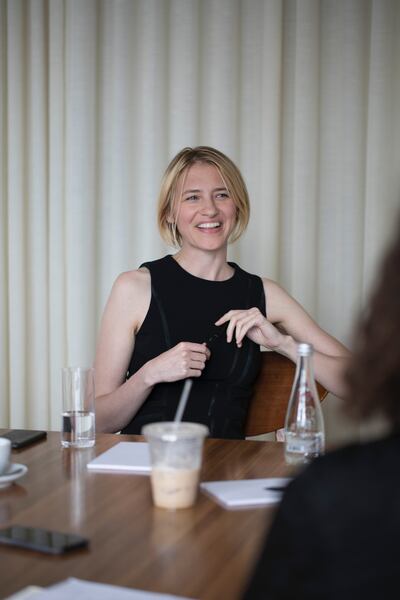
Sara Ziff| Source: Photo by Katharina Poblotzki
SZ: Okay. But what if there was a place where me, you, anyone could say, "Okay, there was an experience I had on this shoot, I would like to address it." And then through the Respect programme, we reach out to the company, make them aware of what's happening and give them a corrective action plan. Maybe they no longer want to work with the offending individual if in fact that person behaved very badly. This isn't a punitive programme. It's about helping to coordinate what is a very fragmented business.
KE: We need more scaffolding in the business right now. It's literally a broken set.
SZ: We have worked on legislative advocacy. [In 2013], we championed the child model act in New York State, which extended child labour protections to models under 18. That was a necessary first step, although, believe it or not, that was controversial at the time. And apparently I was going to ruin the business.
JS: It was one of the best things that happened because it stemmed the tide of kids who weren't ready to come here by, like, 60 percent. I always thought, "Why can't Europe do that? If that could happen in Paris. It would just…"
SZ: We receive complaints from all over the world.
LS: Do you think the media has done enough? Has it taken enough time to investigate these wrongdoings? There was The New York Times piece, the Boston Globe piece.
JS: What I found shocking was that people who know better were still willing to keep supporting the accused.
KE: There has to be a moral line for me. I will never not believe the victim of abuse. I will always stand and defend them. I have a suggestion, though. I wonder if during sort of big industry events like the CFDA Awards, why don't we have a programme or a conference with most of the key players in fashion, be it from cosmetic companies or publishing?
JS: My dream has been to put all of these people in a room. Some could tell their stories. But initially when this all happened, a lot of people ignored me, a lot of people disparaged me and then there were some people — major editors — who really shocked me by writing and saying that I was part of the problem.
KE: I think that what's needed as a next step is just some accountability.
JS: We know what's wrong now. Once those two people have shaken hands, everyone will follow suit because that is how the world works.
Phase 3: Action. "There is so much privilege in this business that the hard part is having people accept that change is necessary."
LS: So far, LVMH and Kering signed an agreement, Condé released its charter. Why isn't Hearst involved? Why haven't more companies come forward? Why haven't these companies signed up for the Respect programme?
JS: I don't know. And it's not as though people aren't reaching out and asking.
SZ: We have been meeting and speaking with a lot of different stakeholders and sort of ironing out the finer points.
LS: How do you think you're going to finally be able to get them on board?
SZ: There are companies that want to lead and that know the difference between meaningful, lasting change and acknowledging the problem but not willing to actually take the necessary steps to address those concerns. Beyond health and safety is the lack of financial transparency and accountability in the business, which is connected to health and safety issues as well.
I would say the majority of the grievances that we receive are from models who have not been paid for their work. Something like one-in-five models are working in debt to their agency. We hear from people who have been waiting six months, nine months, over a year, to get paid the money they’re owed from their agency. Obviously some agencies are better than others. But if you are not a supermodel and you don’t have a money manager…
KE: But even a supermodel. Once, I wasn't paid for a shoot for three years.
SZ: These financial concerns are tied to pressures to lose weight, and succumbing to inappropriate sexual demands.
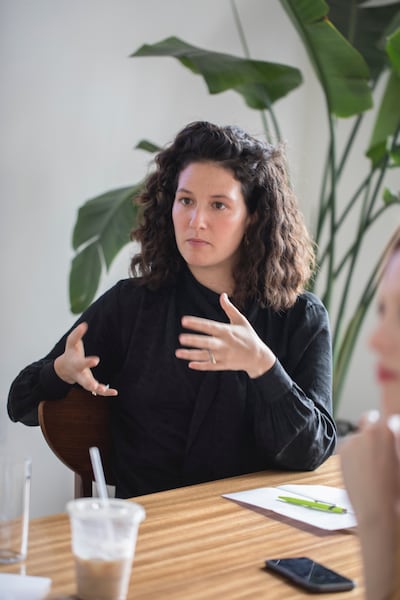
Lauren Sherman, BoF's chief correspondent in New York | Source: Photo by Katharina Poblotzki
LS: How much of this is crisis management, or do you think these bigger companies are serious about making the appropriate changes?
SZ: I do believe that people want to change. But again, you can have one group of people trying to push things forward or another group of people who just don't care because there's no industry standard.
LS: How do you build an infrastructure in such a fragmented industry?
SZ: The approach that we're using, the Respect programme, has been used in other industries and has been hugely successful. In agriculture, for example, which might seem very different, but actually if you map it out it's surprisingly really similar. There is a multilevel structure of hiring between companies like McDonald's, which sources from growers on farms in Florida, which hire agricultural workers who are often working with very few protections. We've got the same sort of thing: publishers and brands will hire models through a middleman and agencies.
You have to have accountability at every step. If it starts with McDonald’s in agriculture, it would start with a Condé Nast or LVMH in the fashion industry. And then the companies that they’re doing business with, their vendors or the agencies, would agree to uphold these standards so that the companies know what’s happening in their supply chain. And then they’re not opening themselves up to liability. Because right now, frankly, any company that has a policy in place but no mechanism to actually uphold those standards is opening itself up to liability.
JS: When I look at the Respect programme, I just don't understand why people aren't already on it. But it will happen.
SZ: Over 100 models, including Karen, including Gisele Bündchen, many of the leading names in the business, have already publicly supported this programme. It's informed by numerous conversations with models working at every level, whether they're more of an aspiring model and they've had to deal with bogus agency scams or top models who have had different kinds of concerns. It's really comprehensive, but it's coming from the bottom up. We know our experiences better than anyone.
LS: Each of you seems to be driven by something greater than yourself. What do feel that your duty is in this?
KE: I'm 39-years-old. I started when I was 15. I've had so many positive experiences, but there are ones that have lingered and hurt or caused damage. I've been publicly fat-shamed, people have said sexually inappropriate things to me, made me feel like I'm nothing. I've seen other women broken. On the inside, I've always been angry about that. Angry and wondering why there was nothing in this industry that protected the girls who were being worshipped. For me, it is personal.
JS: When I came into this business, it delivered on my childhood dream. But it became about power. I couldn't watch the damage anymore. There was just a point where I'd had enough.
LS: And when do you think that happened?
JS: When it became a bigger business. When all of these companies went public, when the conglomerates were formed. If you were a designer that did two collections a year and then all of a sudden now you're part of a conglomerate, you have men's, you have women's, you have resort, pre-fall, post-fall, après-ski, you know, like, 30 collections. You've seen people break. You saw Galliano break, saw McQueen break, you see designers break all the time because it's not sustainable. And unfortunately it just became industry-wide.
LS: It sounds like to me, the positive change in the past year is that the industry as a whole is beginning to acknowledge that there is a problem. What needs to happen next?
KE: People [need to] start talking openly. People [need to] start taking accountability and responsibility for how this industry has been and how it can change. Brainstorming!
JS: Instead of denying or having a puff piece come out, people need to say, "Hey, you know what, I did this. And how about with my experience, we try and move forward because I did do bad things — or I did do the wrong thing — and now would like to rectify what I put out there."
SZ: I would be remiss if I did not say companies should join the Respect programme. This is a programme that works, this isn't an experiment. This works. It's been held up as the gold standard by the United Nations Human Rights Council. We are building on the work of some very smart people who've dedicated their lives to trying to address seemingly intractable problems in industries where workers were treated very poorly.
KE: There is so much privilege in this business that the hard part is having people accept that change is necessary. We must open their minds up to the possibility of things being different but better. You know, I think people [feel] different. If you have a shred of empathy, that's how it should be.
This conversation has been edited and condensed for clarity.
This article appears in BoF's latest special print edition.
To receive a copy of BoF's latest special print edition — including the complete index of BoF 500 members — sign up to BoF Professional before November 2, 2018 and enjoy additional benefits including unlimited access to articles, daily members-only insights and analysis and more with your annual membership.
Related Articles:
[ A New Charter Aims to End Model Abuse: Will It Work?Opens in new window ]
[ New Guidelines on Models' Rights Aim to Fix Industry WrongsOpens in new window ]
[ Op-Ed | Changes to the Law Would Stop the Exploitation of ModelsOpens in new window ]
From analysis of the global fashion and beauty industries to career and personal advice, BoF’s founder and CEO, Imran Amed, will be answering your questions on Sunday, February 18, 2024 during London Fashion Week.
The State of Fashion 2024 breaks down the 10 themes that will define the industry in the year ahead.
Imran Amed reviews the most important fashion stories of the year and shares his predictions on what this means for the industry in 2024.
After three days of inspiring talks, guests closed out BoF’s gathering for big thinkers with a black tie gala followed by an intimate performance from Rita Ora — guest starring Billy Porter.